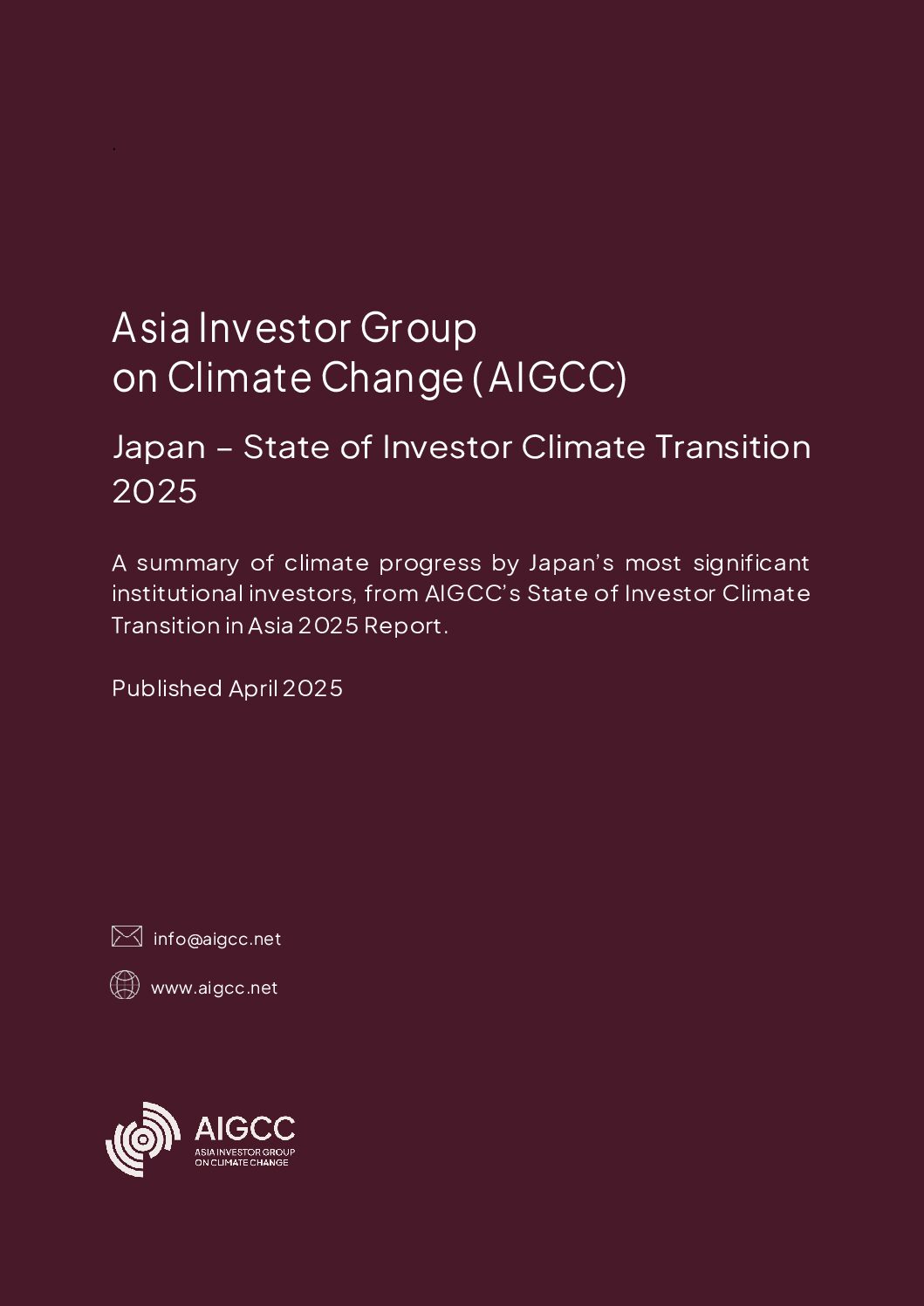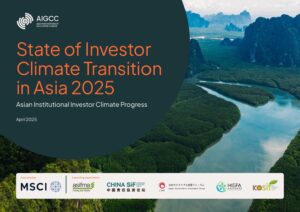Japan’s institutional investors are ahead of the overall Asian sector across several key climate management metrics, mainly in corporate engagement, disclosures, and policy advocacy.
The climate metrics assessed the performance in managing climate risks and opportunities of 22 Japanese asset owners and 13 Japanese asset managers, with a median in assets under management (AUM) of approximately 13.30 trillion JPY (US $89 billion).
The data is an exclusive Japan extract that complements the sixth edition of the Asia Investor Group on Climate Change (AIGCC)’s annual flagship report, ‘The State of Investor Climate Transition in Asia’, which reviews 230 of the most significant and influential investors across Asia.

Download the Briefing
The research finds Japanese investors are ahead of their regional peers in:
- Portfolio Emissions Reduction Commitments. Japanese investors are increasingly committed to setting 2030 or 2035 emissions reduction targets. 63% of Japanese investors (22 of 35), representing US$8.2 trillion in AUM, have now pledged to achieve net-zero portfolio emissions in the same time period.
(vs Overall Asia Investor Average of 46%)
- Investing in climate solutions. 43% of Japanese investors now have a target for, or track investments in, climate solutions or transition finance, though generally these often only apply to a small portion of their portfolio.
(vs Overall Asia Investor Average of 35%)
- Stewardship reporting. 63% of Japanese investors are conducting stewardship reporting, demonstrating the value they see in engaging with their portfolio companies to adopt credible climate transition plans.
(vs Overall Asia Investor Average of 39%)
- Publishing climate-related disclosures aligned with international standards, for example International Sustainability Standards Board or Taskforce for Climate-related Financial Disclosures, where Japanese investors scored an average of 72%.
(vs Overall Asia Investor Average of 54%)
Furthermore, asset managers are outperforming asset owners in this metric – only 27% of asset owners measure and disclose portfolio carbon emissions, compared to 67% of asset managers.
However, there is room for improvement on certain aspects of climate governance and investment, for example:
- Linking executive renumeration to climate performance. Japanese investors have scored an average of 20% (vs Overall Asia Investor Average of 23%).
Asian investors who have linked climate performance to executive remuneration on average are only slightly ahead of Japanese counterparts, indicating that there is still potential for further progress amongst investors, including Japanese investors, all across Asia.
- Asset-level targets that show alignment of different asset classes to global climate goals, for example in accordance with the Net Zero Investment Framework 2.0, are still insufficient to meet Japan’s and global climate goals.
Furthermore, there is opportunity for asset owners to step up in this respect, as only 5% of asset owners have set asset alignment targets, compared to 46% of asset managers.
(Japanese Investor Average of 19% vs Overall Asia Investor Average of 25%.)
AIGCC CEO, Rebecca Mikula-Wright said: “The increasing and more frequent physical impacts of climate change being seen in Japan, which can largely be attributed to human-made climate change, mean there’s a lot at stake for investors. Japanese investors who know how to manage these risks and opportunities will lead the market in protecting and enhancing long-term financial returns to their beneficiaries and clients.
“AIGCC data reveals that Japanese investors are significantly ahead of regional peers in most aspects of climate action. This is a prime opportunity for Japanese investors as they can create a first-mover advantage to be a climate leader in the region.
“Japanese asset owners are positioned to be pivotal drivers of climate action. Their mandates provide a catalyst for asset managers’ investment decisions and stewardship practices that would help to accelerate Japan’s climate transition.
“In fact, AIGCC members, including Japanese members, especially those in Japan are outperforming the market across all climate indicators, demonstrating the benefits of learning together to make faster progress on the biggest systemic challenge of the century.”
Hiroshi Ozeki, CEO of Nissay Asset Management, said: “In Japan, the disclosure of risks and opportunities related to climate change is progressing and we welcome these developments. The frequent occurrence of natural disasters in recent years has made us realise that the risks of climate change caused by human factors affect not only Japan but everyone living on this planet.
“Taking action on climate change not only mitigates risks but also leads to proactively seizing investment opportunities that lead toward Japan’s low-carbon future. For example, it is becoming increasingly important in Japan to invest in renewable energy and to allocate funds to companies that contribute to climate adaptation measures, such as addressing rising sea levels and heat stress.
“We believe that, as Japanese investors, we have a unique opportunity to take the lead in climate-conscious investments, and we are committed to fulfilling this role.”
AIGCC will present more insights in an in-depth investor briefing to be held in Tokyo, Japan on 30 April 2025, focussing on data from AIGCC’s flagship report, State of Investor Climate Transition in Asia and the performance of Japan-headquartered investors.
This will be followed by a panel discussion, moderated by AIGCC, featuring: Hiroshi Kobayashi, Chief Sustainable Investment Officer, Nissay Asset Management; Takeshi Wada, Senior Stewardship Officer, Sumitomo Mitsui Trust Asset Management; and Tomoki Takahashi, Vice President, Climate Specialist, Japan, MSCI.
AIGCC thanks MSCI for their sponsorship of the report and event as well as Nissay Asset Management for hosting the event.
AIGCC’s ‘The State of Investor Climate Transition in Asia’ report is the most comprehensive and reliable snapshot of how decision-makers in the region’s capital markets are managing climate and nature; perhaps the biggest factors influencing the region’s long-term economic development.

Access the full report here